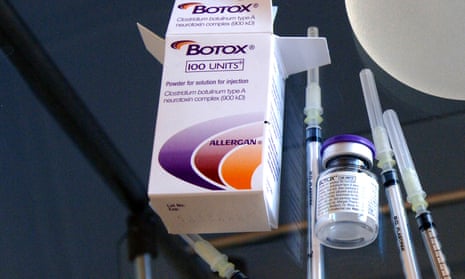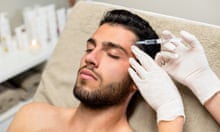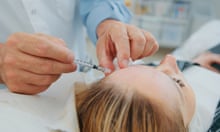New research has found that nine in 10 beauty clinics are breaking the law by advertising Botox, sparking fresh concern about Britain’s £3.6bn “wild west” cosmetic treatments industry.
Academics at University College London (UCL) found that 88% of London clinics were flouting regulations banning the advertising of Botox and other forms of botulinum toxin that are intended to protect public health.
Q: What is Botox?
A: Botox is the best known of the seven different brands or forms of botulinum toxin that are available and used, mainly in the beauty industry, in the UK. Botulinum toxin is generally, but often wrongly, referred to as “Botox”.
Contrary to popular perception, “Botox” is not a generic term, but the tradename of just one of these seven forms of botulinum toxin. The others include Xeomin, Azzalure, Dysport, Vistabel and Bocouture.
Confusion can arise because Botox, made by Allergan, is by far the best-known brand of botulinum toxin because it was the first on the market.
Q: What are Botox and other botulinum toxins used for?
A: Botulinum toxin is used to treat some medical conditions, including those that involve involuntary muscle movement as well as neck spasms, sweating, overactive bladder and lazy eye, and also to prevent migraine.
But it is much better known as a cosmetic beauty treatment. It has acquired a key role in the booming non-surgical aesthetic treatment sector because it is a toxin that stops a muscle moving for a limited period. Injections of botulinum toxin relax the muscles in the face. Because of that, it is widely used to smooth the lines and wrinkles that people get as they age, such as crow’s feet and frown lines.
Treatments, typically costing between £100 and £350, last for three to four months.
Q: Why are more people having injections of Botox and other botulinum toxins?
A: Business is certainly booming. The new research into beauty clinics administering such injections says: “The size of the [cosmetic botulinum toxin] market is estimated to be growing at a compound annual growth rate of 12.4% globally from 2022 to 2030.”
The number of people prepared to have non-surgical beauty treatment in order to – they hope – enhance their appearance is rising significantly. That also includes people having laser hair removal, chemical peels, and dermabrasion, for example.
The cosmetic treatment sector was worth an estimated £3.6bn in 2015. However, that figure is likely to have risen since, given the increase in the number of beauty clinics.
The Commons health and social care select committee last year investigated the impact of body image issues on mental and physical health. In its report, it noted that “the advent of social media and rise in online advertising have both increased exposure to certain idealised body types”. It also heard that “body image dissatisfaction and its associated health impacts can affect anyone regardless of gender, sexuality, ethnicity or age”. The MPs voiced concern about the number of under-18s who are unhappy with their appearance.
The willingness of celebrities such as Kylie Jenner to discuss their beauty regimes has also contributed to an environment in which having a cosmetic procedure has become much more normalised, experts believe.
Q: What are the risks associated with injections of Botox and other botulinum toxins?
A: The NHS says: “The risks of botulinum toxin injections are small if it’s done correctly by a suitably qualified practitioner.” However, there are risks – things can and do go wrong.
If the injection is not administered properly, the customer can experience complications such as pain, swelling, bruising, a headache, partial facial paralysis or even disfigurement, a US study found in 2020. A number of actors and television presenters who have had injections have been seen to have frozen features as a result.
The new study says: “The proliferation of providers and practitioners of cosmetic botulinum toxin and dermal filler has profound public health implications.”
Q: How is botulinum toxin regulated in the UK?
A: Not very well. In 2013, a government-commissioned review of the cosmetic treatment industry, by the then NHS medical director, Sir Bruce Keogh, concluded that injections to plump up people’s skin were a “crisis waiting to happen”. He recommended tighter regulation, in order to keep clients safe, but no government since has acted on his recommendations.
A doctor, dentist or nurse has to prescribe the botulinum toxin that someone wants to be injected with, but someone else – such as a beauty therapist – is often the person administering it. Their lack of training has been a concern for many years.
Botulinum toxin is a controlled medicine, and thus covered in theory by a range of safeguards, such as the ban on advertising it. But dermal fillers – other substances that are injected into people’s faces and lips for aesthetic reasons – are only classified as a “medical device”, so there are no restrictions on advertising it.
Keogh advised ministers in 2013 – as did the Commons committee last year – to change that classification so that dermal fillers acquired the same legal status as botulinum toxin. But ministers have so far ignored the advice.
However, the law was changed in 2021 to ban beauty clinics from administering Botox or dermal lip fillers to anyone under the age of 18 in England.








